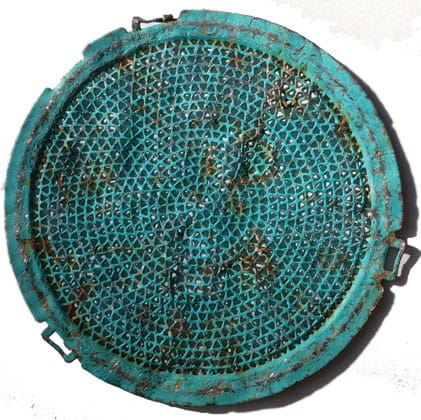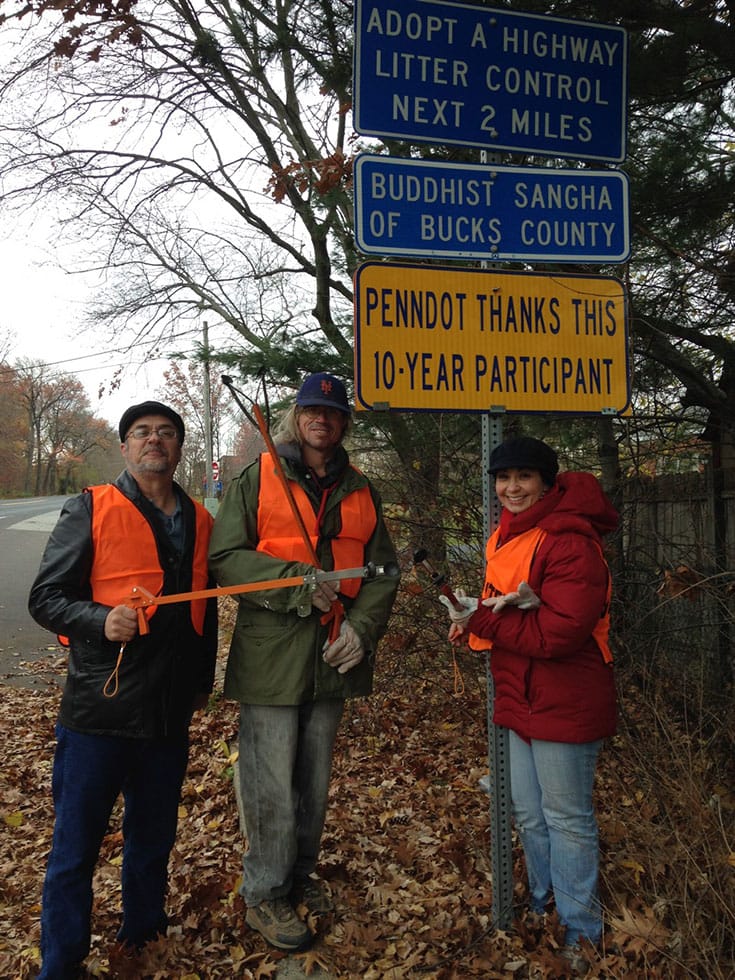The winds of an impending winter arrive on an early Sunday morning in late November, the day of our sangha’s bi-annual roadside cleanup. The Buddhist Sangha of Bucks County has been responsible for cleaning the same stretch of road in Levittown, Pennsylvania for over a decade now. Six brave souls have shown up, donning safety vests and armed with trash pickers. We set off to make America clean again.
We head valiantly into the wind, garbage bags awkwardly fluttering by our sides. Partway through my trash picking, I spot a round, blue object. I pick it up, and admire its star-like pattern. It’s strangely beautiful, almost mandala-like. I can’t help but think of the trite saying, “One man’s trash is another’s treasure.” I stuff it in my pocket.

It’s right that we’re out here. Picking up litter is akin to our dharmic path: seek out the landscape of refuse, and clear it with purpose, much like noticing our own negative mindstates, observing them, and allowing them to pass.
Even those who throw 32-ounce plastic containers onto the street deserve our love.
While cleaning the roadside, I begin to imagine each piece of garbage I pick up as the anger, jealousy, or indifference I experience. Recognizing the pain caused by these mind states, a tenderness of heart develops, and I remind myself that a willingness to sit with this pain is where the path of compassion begins. I see the trash, hold on to it, consider it, and let it go, making way for a greater spaciousness.
Earlier, I zoomed past in my car and saw a relatively clean street. But on foot, slowed down, I notice how much garbage there is. My bag quickly fills up, and I start to judge. “Who would toss out a 32-ounce plastic container onto the street?”
Such judgments feel like those we make when we begin to sit and, inevitably, become aware of our own inherent delusions. We are shocked to find so many out-of-control thoughts within us. We may even decide early on that we are just not very good at this meditation thing. Here is where compassion practice comes in handy. As we practice forgiving ourselves, we slowly become less judgmental of both ourselves and others. Even those who throw 32-ounce plastic containers onto the street deserve our love.
We continue our cleanup and come upon an area overgrown with brambles, tangled with a myriad of plastic bottles, fast-food cartons, cigarette boxes, an old sweatshirt, and a softball thrown too far. I feel myself getting lazy as I reach through the tortuous vines. I’m tempted to leave some of this hard-to-reach litter behind, much like the deeply entrenched habits of mind that are stubbornly woven into my psyche. But, with a light hand, and patient persistence, I can come to wrap my hand gently around the entangled litter. I can cradle it, and patiently care for it with a kindness that softly exposes and heals it. With a newfound sense of compassion and equanimity, I push on.
Sometimes we just make a mess of things, but in those moments we can choose to practice self-acceptance and compassion.
“How could you not have seen that?” I think as I pick up the soda can my friend has overlooked, just as I turn around to see him picking up a large bottle I’d missed myself. We cannot force awareness. When the causes and conditions are ripe, awareness arises.

The wind suddenly speeds up and an empty garbage bag I’m carrying is pulled into the current, floating away. Run as I might, I can’t catch it. Even in my effort to clean up, I have polluted. Sometimes we just make a mess of things, but in those moments we can choose to practice self-acceptance and compassion. I place my hand on my heart, breathe in deeply and say, “It’s not easy being human. May I hold myself in compassion.”
I’m rewarded for this by coming upon a dead raccoon. Its glossy tail is still lush, but the terror and fear of its final moments are frozen on its face. It was likely caught by surprise as it crossed the street, just as it had so many times before. This life is precarious, and death may come unexpectedly. “Am I ready?” I wonder, stopping in my tracks. I pause and breathe three belly breaths, becoming aware of this litany of thoughts and letting them drop. I return to my breath, to my body, to the weight of the bag in my hands. There is only the whistling of the wind through the branches, and my pulsating heart.
I feel for the blue mandala in my pocket and pull it out. “A beautiful sacred object,” I think, “not trash at all.”

